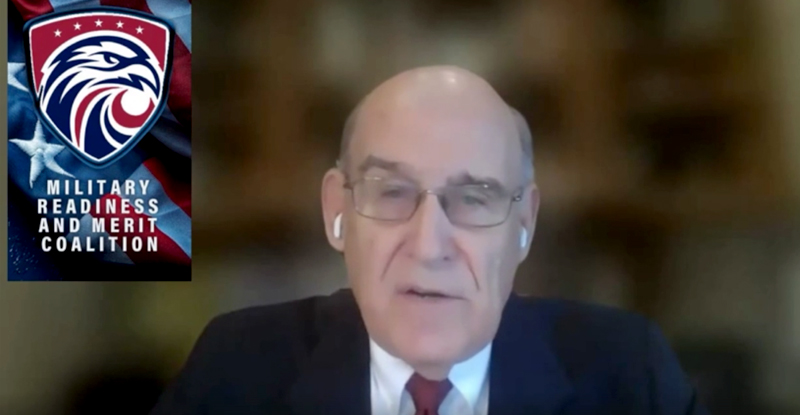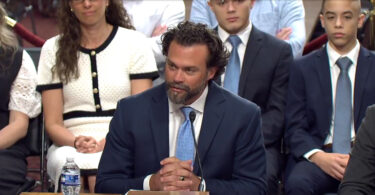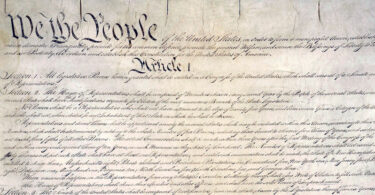Testimony from member of the Military Readiness and Merit Coalition, Scott McQuarrie, USMA ’72 and President of Veterans for Fairness & Merit. He had made plans to travel from Texas to attend the May 2024 DACODAI meeting in person in Arlington, VA until DACODAI canceled the public from attending in-person.
Transcript
Thank you, General Bishop, for inviting me to participate in this panel.
I want to talk about the facts on the ground, because the American people don’t know the facts on the ground, because the Defense Department has succeeded in concealing those facts for far too long.
So one of my endeavors is to make sure that we start getting the facts on the ground out.
The reality is, our warfighters need the best qualified leaders 100% of the time. But because of DEI, they’re not always getting them.
Most combat veterans will tell you that incremental differences in leader quality often determine the difference between mission success or failure and life or death on the battlefield.
That’s not an exaggeration.
That’s why it’s critically important that our officer leaders be the product of programs that select candidates exclusively on the basis of merit, regardless of race or ethnicity.
Most people know that our service academies exist to educate and train our future military officer leaders.
But those service academies are intentionally using racial preferences when making admissions decisions to shape, to use the word of one academy superintendent recently, the racial demographics of incoming classes.
Now, the academies claim that they’re not lowering standards when doing so, but there’s plenty of evidence showing that standards are being lowered.
Let’s be clear, though. There are many outstanding minorities who graduate each year from our service academies. That’s a good thing. They gained entrance to the academies on the basis of merit. They are not who I’m talking about.
Instead, I’m talking about the substantial numbers of lower qualified minorities who are preferenced into admission in the service academies at West Point.
A 2020 inspector general investigation report documented that the average composite academic scores, and I’m not talking just about standardized test scores for blacks, were over 13% lower than those of whites. That means in individual cases, the differences were 20% or more.
West Point has rejected the applications of whites and Asians, even though their overall qualifications were as scored by West Point’s own formula, which they call the whole candidate score, 20% greater in order to make room for lower scoring blacks and Hispanics, all in an effort to fulfill what West Point calls class composition goals, some of which are expressly race based.
Similar differences have been shown at the Naval Academy, and anecdotal reports regarding rejected applicants to the Air Force Academy suggest that it’s happening there as well.
A 2022 GAO report found that over a five year period at all three academies, blacks and Hispanics had disproportionately high attrition rates, while whites and Asians had a disproportionately low attrition rate.
That means slots were needlessly lost forever, and that’s because of DoD’s implementation of DEI. It also means taxpayer money was wasted in pursuit of DEI.
But the harm does not end there.
West Point cadets performance has been measured by demographic in a study that was published in 2021. On average, black cadets performed lower, using West Point’s own metrics to measure character development and military program performance.
Again, I want to stress these are averages, and there are certainly many high performing minorities and low performing whites.
I’m just repeating what the data as reported in professional literature has shown for the demographic categories as a whole.
One group of authors, and this is really incredible to me, all from West Point–three of them, officers serving at West Point, wrote in 2017, the Army has had to lower its accession standards to achieve what it considers to be a desirable demographic distribution in its pre commissioning programs. Unquote.
How does West Point do this? What are the ways West Point implements DEI in admissions?
I can tell you they’re recently being disclosed. The layers of the onion are being peeled back, and they will be shocking to anyone who believes in equal opportunity.
Here’s an example. They intensely and unnecessarily lower the minimum qualification bar.
Their minimum whole candidate score is 5200, which is very low. They also waive that minimum level with no floor, commonly to meet their class composition goals.
The bar could be set at 5800, significantly higher with fewer waivers, and they would still be turning away qualified applicants with scores greater than 5800.
Why do they do this? Anyone who’s been serving in the military knows the answer to that.
It is so that the military, DoD, and West Point in particular, can say to the public, to the congress, everyone is qualified. Well, sure, everyone’s qualified. If you set the bar artificially low.
Here’s another one. They restrict eligibility for issuance of a letter, which they call a letter of assurance, or LoA, on the basis of race. That letter is effectively an early admission decision, but they have criteria for that letter that vary by race.
If you’re a white or asian male, for example, you must have a whole candidate score of greater than 6800. That’s assuming you’re not a recruited athlete. If you’re a woman, it goes down to 6500. If you’re hispanic, 5600.
If you’re black, there’s no stated minimum for issuance of an early decision acceptance letter. None.
Here’s another one. They reserve the second largest appointment category, second largest after the congressional category, and which is about 23% of the incoming class, is reserved, and it’s called additional appointees. They reserve that category for diversity applicants and recruited athletes.
Their internal directive, their governing document, recently disclosed in litigation against West Point, even explicitly states that those appointments, and again, we’re talking in recent years, it’s about 282 for West Point, may be given out not in order of merit, and even though higher scoring, better qualified candidates will be passed over and not admitted in express writings in their own governing document.
West Point also devotes considerable resources in the form of remedial academic programs, which is a good thing to help struggling cadets make it through.
But those extra resources come at a cost, of course, and still lower graduation rates and lower GPAs persist.
So the pursuit of diversity goals in service academy admissions yields a lower return on investment for the taxpayer, fewer graduates of lower quality, and it comes at increased cost.
Something else the service academies do that is highly inappropriate and frankly, offensive is when senior year cadet chain of command positions are designated.
One would think that merit alone determines who is selected for various positions of responsibility. Unfortunately, that’s not the case.
Multiple reliable reports from officers who were involved in the selection process, to me, have confirmed what most cadets figure out on their own: Race, ethnicity, and gender are considered when those cadet chain of command positions are made.
This teaches a terrible lesson to the cadets.
It undermines trust in the integrity of the officer chain of command, which conceals this discrimination. It erodes morale.
Some cadets have even responded in frustration, saying, why even try?
Worse still, I have received two independent reports, one from an active duty serving battalion Army battalion commander, in a face to face conversation confirming that racial goals influence, in some instances, who is selected for command in the Army’s battalion Command Assessment Program.
That program, the acronym for it, is BCAP. BCAP is a great program, but it has been infected by the use of racial quotas.
Warfighters care about their leader’s competency, moral courage, and character, not their skin color.
DoD’s obsession with racial preferences is unquestionably lowering the quality of our officer leaders, and that is a professional and moral failure.
It reduces our combat effectiveness. It jeopardizes national security.
And that lowered quality when it occurs also increases the risk that our warfighters will die on the battlefield. Just ask any real combat veteran.
Thank you for allowing me to share these views with you, and I look forward to participating further with the panel.








Leave a Comment